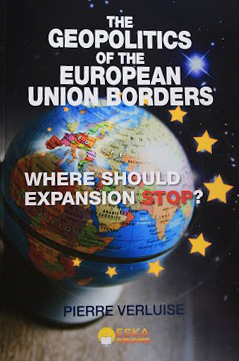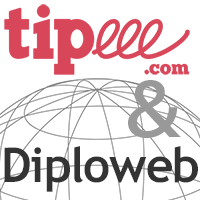Pierre Verluise, “The Geopolitics of the European Union Borders, Where should expansion stop ?” Eska, 2014.
Pierre Verluise delivers a master stroke with this work that operates on two levels : as a manual of geopolitics and an essay on the Eastern and Southern borders of the European Union. Thorough and informative, it steps outside the box of back-slapping political correction.
This work offers clear, precise answers to the following questions :
. How far does the European Union still plan to expand ?
. What relations does the EU now entertain with the Eastern countries that were so recently perceived as enemies ?
. How is the EU organizing its relations with the South ?

Director of the geopolitical Web site Diploweb.com. Pierre Verluise closely monitors the development of the European Union and its borders. He is a lecturer in geopolitics at the Sorbonne. He founded the seminar on European geopolitics at the French “War College”. He is Distinguished Professor of Geopolitics at GEM.
More
Catherine Durandin [1] presents Pierre Verluise’s work, “The Geopolitics of the European Union Borders, Where should expansion stop ?” Eska, 2014.
Pierre Verluise delivers a master stroke with this work that operates on two levels : as a manual of geopolitics and an essay on the Eastern and Southern borders of the European Union. Thorough and informative, it steps outside the box of back-slapping political correction.
With his latest work, “The Geopolitics of the European Union Borders, Where should expansion stop ?” Eska, 2014, Pierre Verluise offers us an excellent tool box, stepping back from − yet contributing to − the debate on the heavyweight themes at the core of the development of contemporary Europe, its relationships with Russia and the Mediterranean zone… By way of conclusion, he presents a Europeans’ wish list for the Europe of the future.
The 146-page work comes in a reader-friendly format and has been painstakingly edited.
Who are the candidates for EU accession and what is the European External Action Service ?
Part 1, devoted to the foreseeable extensions of the EU, adopts a conventional presentation to discuss the maturation of the European Commission’s accession demands since 2011 and the EU’s desire to bolster the force of law in candidate nations : “the Commission will propose a new approach with respect to issues related to the judiciary and fundamental rights and to justice and home affairs”, notes the author, evoking the experience acquired in the accession negotiations with Croatia. Worth noting here, no doubt, are the disappointments and disillusionment caused by rule-bending and the slothful inefficiency of anti-corruption measures in Romania and Bulgaria…
The sketches of the official and potential candidates for accession are succinct but uncompromising, and are liberally sourced from Commission reports. The perceived corruption rate is given for each would-be member. The teacherly Pierre Verluise uses comparison to drive home points that help us to gauge the state of play, social realities and mindsets. Take, for example, Albania : “The country has a Corruption Perceptions Index of 3.1 out of 10, on a par with the Kingdom of Swaziland”. Albania nonetheless does better than Kosovo, the most corrupt of all the EU’s official or potential candidates.
The Turkish candidature is treated sensitively, with no ostensible partisanship.
As from Chapter 3, entitled “What is the European External Action Service ?”, the debate opens up, the geopolitical handbook melding into a vein that has more of the essay. The tone is tougher : “Can anyone remember Lady Ashton taking a forceful stance during the ‘Arab Spring’ ?”, asks the author. Is the EU’s weakness intrinsic to its institutions or quite simply the result of a lack of collective supra-national willpower ?
Where does Eastern Europe end ?
Part 2 questions the EU’s relations with Russia and Ukraine, and the Eastern partnership. The author brings a dynamic to the discussion, while easing the reader in, by including quotes and interviews with undisputed specialists like Jean Sylvestre Mongrenier, Florent Parmentier, Céline Bayou and Philippe de Suremain, French ambassador in Ukraine from 2002 to 2005.
How is the EU dealing with the South ?
Part 3
discusses relations between the EU and the South. In the last fifty pages, the author raises the tone and takes a critical look back at the lopsided inception of the Union for the Mediterranean : “With no offence intended against the instigators of the Mediterranean Union, projects like this cannot be cooked up at hustings”… He goes on to chastise the EU for its myopic, inconspicuous development aid policy. These pages provide for thought ! The country that benefits the most from community funding – Morocco – is addressed in a chapter that pulls few punches.
Pierre Verluise delivers a master stroke with this work that operates on two levels : as a manual of geopolitics and an essay on the Eastern and Southern borders of Europe. Thorough and informative, it steps outside the box of back-slapping political correction.
The EU is expanding, but what do Europeans want ? The author rejects Euroscepticism and invites them to take the subject into their own hands. This is a book for those who need to know how and why.
English translation : Alan Fell
CC-BY-ND-Licence de libre diffusion
Question, exploringgeopolitics.org : What does the book contribute to existing literature in the field ?
Pierre Verluise : "In France, Michel Foucher and Stéphane Rosière each in their own way have contributed to the analysis of borders, but none of them centered their exploration on the European Union. Moreover, my approach does probably more to bridge the gap between research and the general public.
The uncertainty regarding the delineation of the borders of the European Union feeds an anxiety among the population that the European elites underestimate willingly. Just like a boomerang, these popular concerns lead to a decreasing popularity of the European Union."
Pour ne rien rater de nos nouvelles publications, abonnez-vous à la Lettre du Diploweb !
[1] Catherine Durandin is an author and historian, and graduate of the Ecole Normale Supérieure in Paris. She holds an advanced degree in History, and a doctorate in literature. She also has an INALCO Diploma in Romanian.
Direction

Directeur, P. Verluise
Conseil scientifique
Mentoring et coaching géopolitique
Présenter le Diploweb.com
Charte du site
Auteurs
Proposer un article
Retrouvez la chaîne Diploweb sur :











